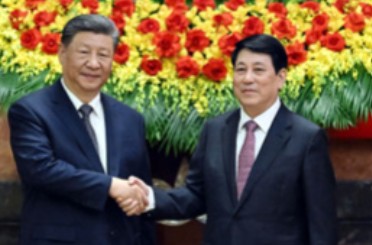HANOI – Chinese President Xi Jinping arrived in Vietnam on Monday as part of a high-profile Southeast Asia tour aimed at strengthening regional alliances and promoting economic cooperation in response to rising global trade tensions and sweeping U.S. tariffs.
Vietnam is the first stop on Xi’s three-nation tour, which will also take him to Malaysia and Cambodia. The visit is widely seen as part of Beijing’s effort to project itself as a stable and reliable alternative to the United States in the face of growing global uncertainty.
During his visit, President Xi met with top Vietnamese leaders in Hanoi and called for unity in defending multilateral trade, saying both nations must “oppose unilateral bullying and uphold the stability of the global free trade system,” according to Chinese state media. The comment was a veiled reference to recent trade actions by the U.S., including across-the-board tariffs introduced earlier this month.
Strengthening Economic and Security Ties
The visit culminated in the signing of 45 cooperation agreements between China and Vietnam across a broad spectrum of sectors. Key areas of cooperation include:
- Supply chain integration to bolster economic resilience
- Joint research in artificial intelligence
- Expanded maritime patrol coordination, signaling closer security cooperation in the South China Sea
- Railway and infrastructure development, linking regional trade routes
These agreements reflect Beijing’s strategic pivot toward deeper economic interdependence with ASEAN members at a time when U.S.-China trade tensions are escalating.
Washington Watches Closely
In Washington, the diplomatic move did not go unnoticed. Former President Donald Trump, commenting from the White House lawn, downplayed the meeting but hinted at its implications:
“That’s a lovely meeting… like trying to figure out how do we screw the United States of America.”
He added, “I don’t blame China. I don’t blame Vietnam. I see they’re meeting today, and that’s wonderful.”
Despite his words, analysts say the trip reflects China’s long-term strategy to build influence in the region and create trade alternatives that circumvent American-led systems.
China: Reshaping global trade dynamics
President Xi’s trip to Vietnam, and upcoming stops in Malaysia and Cambodia, underscore China’s intensified efforts to lead in regional diplomacy and reshape global trade dynamics amid increasing economic decoupling between China and the U.S.
As Southeast Asian nations weigh their options in a shifting geopolitical landscape, China’s message is clear: economic partnership with Beijing offers both growth and stability — without the volatility of U.S. domestic politics. (zai)
Photo: Vietnamnet

